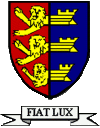by Gordon King
It was January 1937 and we on the staff of Dover County School wondered what changes the new Headmaster from Faversham would make. Rumour had it that on his arrival as the new Head at Faversham Grammar School he had changed everything. It must be remembered that in those days a change of Headmaster was regarded by the staff with some measure of apprehension. In fact Mr. Booth changed very little.
Our new Head was a man who trusted his staff to get on with their work. It became clear that J. C. Booth was one on whom we could rely. His strong Christian principles soon became apparent as did his deep belief in the value of morning assembly. One outcome of this was his insistence that every boy should always have his own hymn book.
He also believed strongly in the value of public examinations. I well remember his delighted agreement to the suggestion that boys who had started to take Economics in the sixth form should sit for Ordinary Level in that subject after studying it for one year.
In 1937 the guest speaker at Prize-giving was Kenneth Lindsay, M.P., a friend of Mr. Booth, who told us what a reliable full-back our Headmaster had been when they both played soccer for Worcester College, Oxford. It would be right, I think, to say that while he enjoyed football, Mr. Booth was devoted to cricket. He was a welcome addition to staff cricket and football teams against the school both before and after the War.
Of all the memories I keep of Mr. Booth, the strongest is of his conscientious devotion to his work. I do not think that he was ever absent from school through illness nor do I believe that he ever missed a Saturday afternoon’s games – soccer, rugby or cricket. Equally assiduous in the holidays, he was at school every weekday morning to deal with correspondence. The one occasion when he gave himself a respite was during Dover Cricket Week which was something he enjoyed immensely.
Beneath his quiet and somewhat reserved manner Mr. Booth had a nice sense of humour and liked to relate an anecdote or pass on a piece of information in an obliquely humorous way. “Those people from the Fenland have been put properly in their place this afternoon,” he once announced gleefully. He was a very approachable man, essentially humble and intensely sincere. His humility often appeared in simple ways. At school dinner he would refuse sugar with his pudding because the boys were not given sugar. Whether at a school harvest camp or when in his retirement he assisted with a boys’ club at Dover Borstal and with Toc H, he would willingly, almost joyfully, undertake the most menial jobs.
A man of integrity and high ideals, he led the school through its darkest and most difficult days for it to emerge revitalised and stronger than before.
